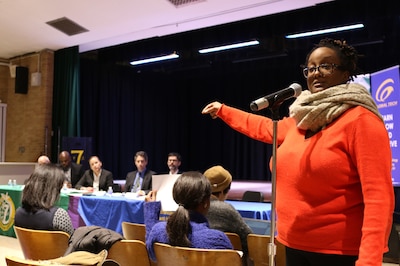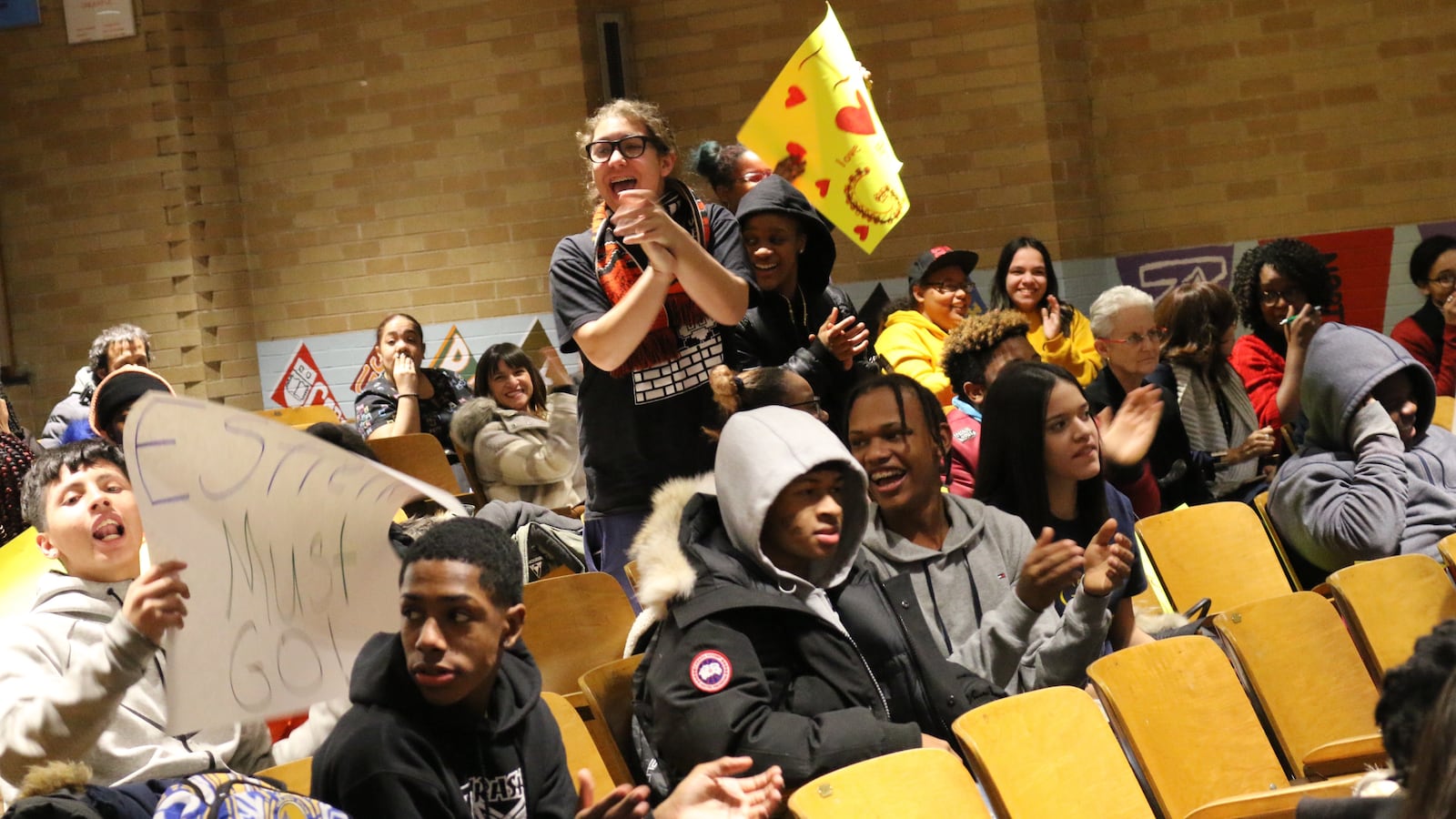When students returned this fall to Global Technology Preparatory, a small middle school in East Harlem, everything seemed off. The principal and most of the teachers had been replaced, and their classrooms were now crowded with unfamiliar students in green uniform shirts, instead of blue like theirs.
The new students were from P.S. 7, a K-8 school in the same building, and people at Global Tech say the joint classes were part of a long-planned consolidation of the two schools that began unofficially last fall — months before the city’s Panel for Educational Policy officially approved the merger on Wednesday.
The threat of the consolidation was partly to blame for the exodus of Global Tech’s teaching staff and principal. After students began taking classes together this fall, clashes were common, along with calls to the police. Now, a school once known for its tight-knit community, intimate class sizes, and focus on technology has been transformed — and not for the better, according to students, parents, and staff.
“It felt more like a community,” said eighth-grader Scarlet Rivas. “Now we don’t have any of that.”
The merger of Global Tech and P.S. 7 follows 21 previous consolidations that Carmen Fariña, New York City’s retiring schools chief, has ordered during her tenure. They reflect her skepticism of the small-schools movement, which led to the creation of hundreds of new schools during the tenure of former Mayor Michael Bloomberg under the premise that they offer more personalized attention and better results than the typical large campus. (Several studies have shown that students had better outcomes at the city’s small high schools than students who attended larger schools.)
Instead, Fariña has argued that very small schools cannot sustain enough teachers and programming to provide students a rich experience, since funding is allocated partly based on enrollment. Consolidation allows schools to pool their resources, slash administrative costs, and put money back into classrooms.
Global Tech was a prime candidate for consolidation. Already small, its enrollment shrank to 120 students this year — too few for the school to afford such basics as a licensed technology teacher, a foreign language instructor, or a parent coordinator, according to education department officials.
Michael Aciman, a department spokesman, disputed the claim that the merger informally began this fall, saying the joint classes represent the kind of collaboration between schools on shared campuses that the city encourages. After the merger officially occurs, it will benefit students at both schools, he added.
It will “address challenges with low enrollment, and create a stronger school option for families with more robust resources and academic programming,” he said in a statement.
But even if the merger makes logistical sense, it has still sparked a backlash.
Since Global Tech opened eight years ago, its staff has prided itself in offering students a portal to the world outside East Harlem, working with organizations that connected students with corporations, allowed them to perform on a Broadway stage, and created opportunities to learn coding skills at Google’s New York offices.
Now, as Global Tech’s faculty and students prepare to be absorbed by P.S. 7, they fear the partnerships, mission, and culture that defined their school will vanish. To them, that feels less like a consolidation than a closure.

“Even if you still close down Global Tech, please process what these young people are saying,” Kayla Hamilton, a former Global Tech teacher, told a panel of city officials at a recent hearing, speaking through tears. “These are people’s lives.”
Word of the city’s plan to combine Global Tech and P.S. 7 first trickled out about three years ago, around the time Fariña instructed local superintendents to flag small schools that could be candidates for consolidation. Superintendent Alexandra Estrella, who oversees East Harlem’s District 4 and has clashed bitterly with another school in the past, told former Global Tech Principal David Baiz about the merger plan in 2015, he said.
After failing to convince Estrella to drop the merger, Baiz said, he lobbied other education department officials to keep the school open — a move that landed him in hot water.
“All of a sudden I was labeled as problematic,” he said, adding that he began being summoned to disciplinary meetings. “I got the picture, so I left.” (He is now earning a doctorate in education leadership at Harvard.)
After he resigned at the end of last school year, 14 of the school’s 16 teachers followed suit. The exodus shook the school, stripping it of much of its institutional memory and sense of community, parents and students said.
The proposed merger was not the sole reason teachers fled; several said that Estrella had denied their tenure applications, raising fears that their careers could be jeopardized if they stayed. However, some connected the tenure decisions to the merger, suspecting that the superintendent wanted to bring fresh faces into the newly combined schools.
“She wanted us out,” said Arnold Kim, a former Global Tech teacher who said his tenure application was blocked. “She can’t do a full makeover if all of the teachers are still there.”
An education department spokesman said Estrella made tenure decisions “after thoroughly reviewing the recommendations and carefully observing classroom instruction.”
Whatever the causes, the mass departure of teachers and the joint classes with P.S. 7 appear to have destabilized Global Tech.
Students with disabilities have received less individual attention this year due to a shortage of special-education teachers, according to school personnel and parents. (Aciman, the education department spokesman, said that Global Tech and P.S. 7 work together to meet the needs of students with disabilities.)
And police have responded to 911 calls involving the campus 31 times since September, while five people have been arrested on campus, according to the police department — a greater number of calls and arrests than during the entire 2016-17 school year.
“When you go there it’s just complete chaos,” said Jasmine Carrasquillo, whose two sons attend Global Tech, recalling a recent visit where she saw students roaming the hallways. “That would never have happened before.”

